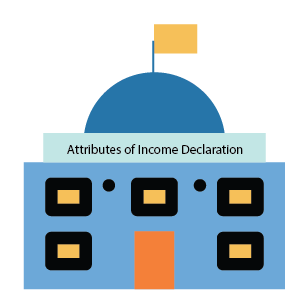
Voluntary Income Declaration Scheme of 2016
In 2016, Narendra Modi led government introduced the Income Tax Declaration Scheme in India to uncover black money and to persuade tax evaders to file Income Tax Returns on their earnings. As per the scheme, individuals who haven’t revealed their actual assets or income to the government in the previous tax assessment year can do so and in turn, instead of the hefty defaulter’s penalty fees, they can pay a discounted tax of 45%.
In case if a company or an individual is caught red-handed by the government for concealed assets then the total of that asset will be added to the income tax slab and the defaulter will also have to pay a hefty fine.
Ways in which Tax Evasion Affects the Economy of a Nation
Tax evasion causes huge loses to a nation’s economy as it deprives the government of resources which could have been otherwise utilized in undertaking developmental projects or for providing its citizens with the basic needs. When an Indian citizen fails to pay his/her taxes the undesirable burden falls upon all the regular tax payers who are levied with higher taxes to compensate for the revenue crunch.
Calculate your Income Tax and Deductions Right Here Get Details
What are the Key Attributes of Income Declaration Scheme 2016?
The Income Tax Declaration Scheme suggests that, a defaulter will not be able to utilize this scheme if they have been issued a notice by the Tax Department or Authorities. The notices served could be in relation to evaluation of the tax evader by the tax department, reassessment proceeding or any such proceedings that are pending.
Income Declaration Scheme also states that its benefits will not be applicable to those claimant upon whom the tax authorities have gained information regarding illegal transactions under tax information-exchange treaties.
- The validity of Income Declaration Scheme 2016 is between June 1, 2016 and September 30, 2016, the tenure of which can either be extended or decreased by the Central Government.
- Income tax and wealth tax are both applicable in this scheme.
- The percentage of chargeable tax lies between 45% – 30% of income tax rate + Krishi Kalyan Cess on 25% of this tax (7.5%) + penalty on 25% of the tax (7.5%).
- Within 60 days from the day of declaration of assets, the individual needs to pay the taxes.
- Upon declaration of additional income if an individual/company fails to pay the taxes before the deadline then the declaration becomes invalid. In addition to that, an income tax rate as per the previous tax year would be charged.

- An individual or a company can make only one declaration, even if multiple declarations have been made, only the first declaration will be taken into consideration.
- Fabricated declarations will be considered invalid.
- On timely payment of taxes and penalties after declaration of income/assets, the amount will be considered as disparate from the normal income tax cycle which will not be added to your income in any assessment years.
- If a part of your income or wealth declaration are assets then its fair market value as on June 1, 2016, would be accounted as the undisclosed income.
- Declared assets/income of a firm/company will not be considered while calculating the wealth or income of its partner firms.
- Undisclosed incomes from investments on assets cannot be considered as Benami Transaction Act, if the said asset is transferred to the declarant or their legal representative.
- Declaration under this scheme cannot be used for charging additional penalties and court cases against an individual/firm.
- This declaration should be produced before The Principal Commissioner or Commissioner of Tax within your relevant jurisdiction.
Categorizing Declarant and Eligibility of an Authorized Representative
Section 2(31) of the Income Tax Act identifies certain eligibility criteria for Income Tax Declaration Scheme.
It also categorises the authorized representative for making the declaration on behalf of the claimant on special cases
- Individuals: If the declarant is in India then he/she can sign the declaration themselves, however in cases when the declarant is out of India or he/she is mentally incapacitated then an authorized representative can sign the declaration on their behalf.
- The Hindu Undivided Family or HUF: The authorized declarant is the Karta of HUF but if the Karta is not in India during that time then any adult member of HUF can be the authorized representative.
- Firms: The managing partner of the firm is the rightful legal declarant but any of the partners can also represent as the declarant.
- Companies: The declaration should be signed by the Managing Director of the company or by a director of the company if due to unavoidable circumstances the MD cannot be present for the declaration.

All these categories of entities can declare for additional income till the assessment year of 2016-17, through Income Declaration Scheme. Taxpayers who have made the declarations would be exempted from inspections, reassessments by the tax authority or from being enquired and prosecuted.
Non-Eligibility Factors for Income Declaration Scheme
- Anyone who have been issued notice under Sections 142(1), 143(2), 148, 153A or 153C (example: those who been served pre-assessment inquiry notice, scrutiny notice, income escaping assessment notice, notice on assessment in case of search or requisition and notice on assessment of income of another person).
- Anyone against whom an ongoing search or survey is being conducted.
- Involvement in cases under the Black Money Act, 2015.
- Person notified under Special Court Act, 1992.
- Involvement in cases under Indian Penal Code, Narcotic Drugs and Psychotropic Substances Act, 1985, Unlawful Activities (Prevention) Act, 1967 or Prevention of Corruption Act, 1988.
The introduction of Income Declaration Scheme is a way of offering pardon to tax defaulters, offering a chance to come forward with the facts. This scheme does not provide complete immunity to defaulters it offers a cut-down on the tax penalties levied upon the defaulters.
People Also Searched For
In the News
-
All India ITR offers free income tax filing assistance for personnel of armed forces
The Economic Times Wealth: Vikas Dahiya, founder and chief of tax compliance platform, All India ITR announced a free of cost tax returns solution for members of the Indian Armed Forces. Due to their disciplined schedules, annual tax returns become a hectic chore for servicemen. They need to repaid for their services to millions of citizens and this initiative will go a long way to alleviate the stresses in their service conditions.
18th July 2017
THE ECONOMIC TIMES
-
Now, file your tax returns with All India ITR mobile app
Gadgets Now: Technology firms are gearing up to meet tax compliance deadlines with great fervour. All India ITR, an online tax compliance firm launched its e-filing app that works on both Android and iOS.
14th June 2017
Gadgets Now
 Tax
Tax
 Income Tax
Income Tax
 Sales Tax
Sales Tax
 TDS
TDS
 GST
GST
 Service Tax
Service Tax
 VAT
VAT
 Tax Calculator
Tax Calculator













